Reverse Osmosis & Water Treatment in Chile
CHUNKE projects of Reverse Osmosis Water Treatment in Chile including different types of water treatment systems.
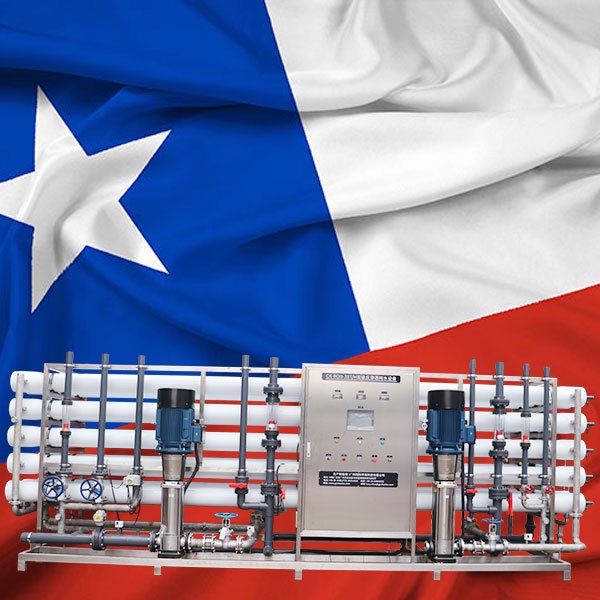
Chile, officially known as the Republic of Chile, is a South American country. It’s located in the western part, bordering the Andes Mountains and the Pacific Ocean. Remarkably, it’s the world’s southernmost country and is closest to Antarctica. The country spans across an impressive area of 756,096 square kilometers. As of 2017, it accommodates a population of approximately 17.5 million. Interestingly, Chile shares borders with Peru to the north and Bolivia to the northeast. It also borders Argentina to the east and the Drake Passage to the south. Simultaneously, Chile exercises control over several Pacific islands. These include Juan Fernández, Isla Salas y Gómez, Desventuradas, and Easter Island. The country also lays claim to a vast 1,250,000 square kilometers of Antarctica, known as the Chilean Antarctic Territory. Santiago, the capital of Chile, is also its largest city. Lastly, the national language spoken across the country is Spanish.
Total Renewable Water Resources in Chile
Between 1971 and 2020, Chile renewable water resources remained stable at around 923.1 billion cubic meters per year.
Renewable surface water : 923.1 billion cubic meters per year
Renewable groundwater : 140 billion cubic meters per year
Renewable water resources per capita : 48,286.8 cubic meters per year
Dependency ratio : 4.1 %
Meanwhile, CHUNKE provides wide range of filtration and economical solutions based on the Chile’s water resources. So, our water treatment in Chile becomes more popular accordingly.
- Surface water is water from river, lake which can be treated using different methods, such as Ultrafiltration Systems, Brackish Water RO accordingly.
- Desalination can be used for water from ocean, or sea source, which can be treated using Sea Water Reverse Osmosis Systems; Desalination Systems
- Ground Water or brackish water is from water located in the pore space of soil and rock “Borehole well”, which can be treated using Reverse Osmosis Systems, Borehole Water Filtration Systems, Well Water Filtration Systems, Chemical Dosing, UV Water Sterilizer accordingly.
- Government water supply, which could have high level of hardness or high level of chlorine, can be treated with Water Softener System, Media Water Filters.
CHUNKE Projects of Water Treatment in Chile
CHUNKE designs and produces water treatment systems that meet the World Health Organization requirements. Our pumps, dosing pumps, reverse osmosis membranes, electronic components, and drives are all world-renowned suppliers. So, our water treatment in Chile is suitable for drinking.
We has over 15 years of experience as a global provider of B2B water treatment solutions for a variety of applications and industries, we offer a large selection of all types of reverse osmosis, ultrafiltration, electrodeionization and water treatment systems to meet your industrial needs accordingly. So, CHUNKE’s extensive global experience in engineering and manufacturing allows us to pre-engineer and customize water treatment and reverse osmosis systems to meet a wide range of customer requirements and specifications.
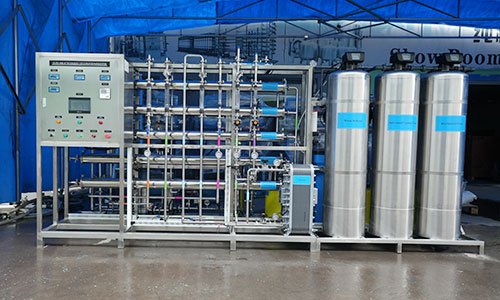
1T-Secondary Reverse Osmosis + EDI Ultrapure Water Equipment
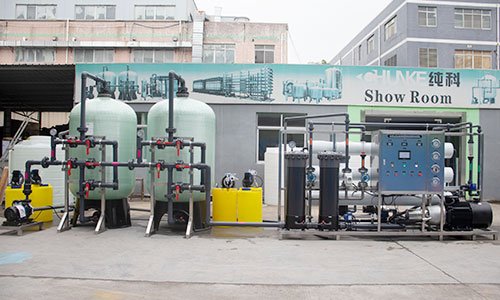
4TH Seawater Desalination Equipment
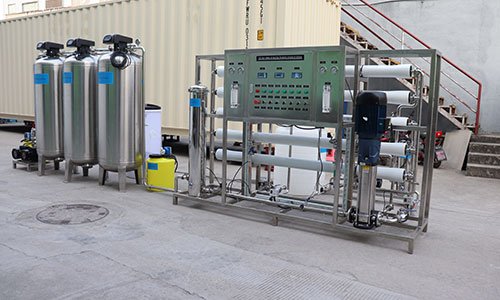
3T Reverse Osmosis Systems Equipment

30T Ultrafiltration Systems Equipment
The Water Crisis in Chile
Chile’s water crisis has had a profound impact on various sectors, especially the mining industry, which relies heavily on water for its operations. The country’s extensive copper mining activities require large amounts of water, leading to the overexploitation of underground aquifers. As a result, rural communities have been forced to sell their land, and the agricultural sector has suffered irreparable damage.
To address this crisis, the Chilean government has developed a national strategy to promote the efficient use of water. However, the scarcity of water sources in certain regions, such as the arid northern Chile, poses significant challenges for traditional water treatment methods.
Reverse Osmosis: A Solution for Water Treatment
Reverse osmosis (RO) is a highly effective water treatment technology that has gained popularity in Chile for its ability to desalinate seawater and purify brackish water. The process involves forcing water through a semi-permeable membrane, removing salts, impurities, and other contaminants.
The Benefits of Reverse Osmosis
RO systems offer several advantages for water treatment in Chile. Firstly, they can provide a sustainable source of freshwater by desalinating seawater, reducing the reliance on scarce freshwater resources. Secondly, RO systems can effectively remove a wide range of contaminants, including salts, heavy metals, and microorganisms, ensuring the production of high-quality drinking water.
Applications of Reverse Osmosis in Chile
In Chile, diverse industries benefit from reverse osmosis technology. This includes mining, agriculture, and municipal water supply. For instance, Centinela Mining and Antucoya Mining have adopted this technology. They use wastewater treatment systems based on reverse osmosis. This strategy helps to lessen their environmental footprint. Additionally, it ensures they meet all regulatory compliance. Transitioning to other sectors, reverse osmosis is also seen in agriculture. It provides clean water for irrigation, boosting crop yield. Lastly, municipal water supplies have also seen improvements. With reverse osmosis, they guarantee safe, clean water for residents. In essence, this technology is reshaping Chile’s industrial landscape.
Ultrafiltration
Ultrafiltration is a membrane filtration process that uses a porous membrane to separate suspended solids, bacteria, and viruses from water. This technology is particularly effective in treating surface water sources contaminated with particulate matter. In Chile, ultrafiltration systems have been deployed in regions where access to clean water is limited, providing a reliable source of safe drinking water
Electrodeionization
Electrodeionization (EDI) is a water purification process that uses electricity to remove ions and impurities from water. It combines ion-exchange resins with ion-selective membranes to produce high-purity water without the need for chemical regeneration. EDI systems have been successfully implemented in industrial settings in Chile, ensuring the production of ultrapure water for various applications, including electronics manufacturing and power generation.
Other Water Filtration Technologies
Chile’s quest for comprehensive water treatment solutions doesn’t stop at established methods like reverse osmosis, ultrafiltration, or electrodeionization . New horizons are being explored, such as activated carbon filtration . This technology, utilizing granular activated carbon (GAC), removes effectively contaminants like VOCs, organic matter, and disinfection byproduct precursors .Moreover, media filtration is another technique under consideration . A notable example is Packed Tower Aeration (PTA), which excels in eliminating volatile contaminants from water .
Finally, advanced oxidation processes are being investigated for their potential application . These, combined with emerging nanotechnology-based methods, promise improved efficiency in water filtration and purification . Each technology brings unique benefits, tailored to specific water quality requirements , enhancing Chile’s water treatment landscape
Challenges and Future Outlook
Indeed, despite advancements in water treatment, Chile still faces numerous challenges in its pursuit of sustainable water management . These challenges encompass social, economic, and environmental dimensions . For instance, rural areas often struggle with sustainability in their drinking water services . However, climate change and water stress are significant hurdles, making Chile one of the most affected countries . Thus, this proposal emphasizes four pillars of action: water management and institutionality, protection and conservation of water ecosystems, efficiency and strategic use of water resources, and innovation and technology. In conclusion, achieving a sustainable water scenario in Chile requires leadership, commitment, and active work from all sectors . This is the path forward in overcoming the persistent challenges in water management.
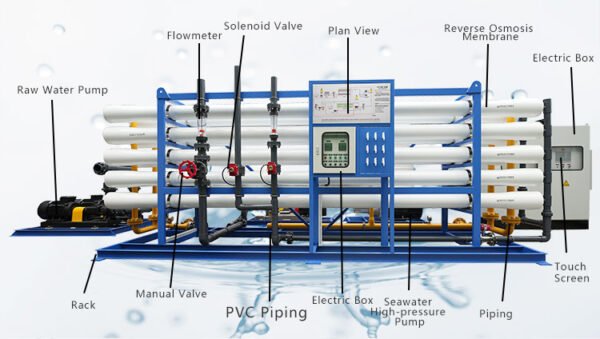
Energy Costs and Environmental Impact
The operation of advanced water treatment systems, such as reverse osmosis and electrodeionization, requires a significant amount of energy. This poses a challenge in terms of both cost and environmental impact. Chile is exploring renewable energy sources, such as solar and wind, to power these systems and reduce their carbon footprint.
Infrastructure Development
Expanding water treatment infrastructure, especially in remote areas, is a tough task. It presents both logistical and financial challenges. For instance, building desalination plants is a considerable undertaking. The same goes for installing pipelines and establishing distribution networks. All these endeavors require substantial investment. They also need careful planning. To overcome these obstacles, creative solutions are necessary. Public-private partnerships could be one such solution. These partnerships can combine government support and private capital. In addition, innovative financing models can play a crucial role. These models can provide the needed funds for water infrastructure. Ultimately, these strategies can help ensure water sustainability. In conclusion, overcoming these challenges requires cooperation and innovation.
Water Reuse and Conservation
With growing water scarcity, the emphasis on water reuse and conservation is increasing . Techniques like wastewater reuse provide a sustainable solution, reducing pressure on freshwater sources . Furthermore, rainwater harvesting offers an efficient method for water management, aiding in the conservation of precious resources . By implementing these strategies, we can mitigate water scarcity and ensure the long-term sustainability of our water resources . Overall, these innovative approaches promise a more water-secure future .
Chunke is Trusted Water Treatment Supplier from China
Reverse osmosis water treatment plays a crucial role in addressing the water challenges faced in Chile. By utilizing advanced RO systems and complementary water treatment technologies, clean and safe drinking water can be made available to both military personnel and the local population. Wastewater treatment solutions further contribute to environmental sustainability and public health. Applying the lessons learned from previous water supply operations, Chile can enhance its water treatment efforts and ensure a sustainable supply of clean and safe drinking water for its people. With the implementation of innovative and efficient water treatment solutions, reverse osmosis continues to be a valuable tool in the pursuit of clean water in Chile.
Chunke Water Treatment‘s expertise in producing high-quality reverse osmosis systems has contributed to improving water treatment capabilities in Chile. So, their reliable and efficient RO plants have been implemented in various projects across the country, ensuring access to clean and safe drinking water.
